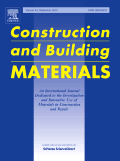
Construction and Building Materials
Scope & Guideline
Driving excellence in building science.
Introduction
Aims and Scopes
- Sustainable Construction Materials:
Research focused on the development and application of sustainable materials, such as recycled aggregates, waste-derived materials, and eco-friendly binders, aiming to reduce the environmental footprint of construction processes. - Innovative Material Properties:
Studies investigating the mechanical, thermal, and durability properties of new materials, including advanced composites, geopolymers, and modified cementitious materials, to enhance performance in construction applications. - Durability and Performance Evaluation:
Research addressing the long-term durability of building materials under various environmental conditions, including freeze-thaw cycles, corrosion, and chemical attacks, to improve material longevity. - Advanced Characterization Techniques:
Utilization of cutting-edge methodologies such as molecular dynamics simulations, X-ray computed tomography, and acoustic emission techniques to analyze the microstructural and mechanical behavior of construction materials. - Application of Artificial Intelligence:
Integration of AI and machine learning approaches in predicting material performance, optimizing mix designs, and assessing structural integrity, contributing to smarter and more efficient construction practices.
Trending and Emerging
- Recycling and Upcycling of Materials:
There is a growing emphasis on the recycling of construction and demolition waste, as well as the upcycling of by-products from various industries, to create sustainable building materials. - Smart Materials and Self-Healing Technologies:
Research into materials that can autonomously repair themselves, or possess smart functionalities, is on the rise, driven by the need for durability and maintenance reduction in construction. - Nanotechnology in Construction Materials:
The integration of nanomaterials to enhance the properties of traditional and alternative building materials is gaining traction, indicating a trend towards advanced material science applications. - Digital and Computational Approaches:
The use of digital tools, machine learning, and computational modeling for predicting material behavior, optimizing designs, and assessing performance is increasingly prominent in recent publications. - Climate Resilient Infrastructure:
Research focusing on materials and designs that enhance the resilience of infrastructure to climate change impacts, such as temperature variations and extreme weather events, is emerging as a critical area of study.
Declining or Waning
- Traditional Concrete Applications:
Research focusing solely on conventional concrete without the integration of innovative materials or techniques is becoming less prevalent, as the industry increasingly seeks sustainable and high-performance alternatives. - Conventional Asphalt Studies:
Papers that explore only traditional asphalt mixtures without considering modifications, recycling, or sustainable practices are declining, as new technologies and materials gain focus. - Non-Eco-Friendly Materials:
Studies that do not address environmental impact or sustainability in material selection and application are becoming less common, reflecting a broader industry shift toward greener practices.
Similar Journals
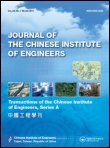
JOURNAL OF THE CHINESE INSTITUTE OF ENGINEERS
Advancing engineering knowledge for a brighter future.The Journal of the Chinese Institute of Engineers, published by Taylor & Francis Ltd, serves as a vital platform for the dissemination of innovative research in the field of engineering. Since its inception in 1978, this journal has been committed to advancing knowledge and fostering academic dialogue in general engineering and its multidisciplinary applications. With its current ranking of Q3 in the 2023 Engineering (miscellaneous) category, it is recognized within Scopus as the 139th out of 307 journals, placing it in the 54th percentile of its field. The journal facilitates access to a diverse range of high-quality articles, promoting a deeper understanding of contemporary engineering challenges. Although it does not operate on an open-access model, its insights are invaluable for researchers, professionals, and students eager to stay at the forefront of engineering advancements. Located in Oxford, England, the journal is poised to continue its influential role in shaping the future of engineering research until 2024 and beyond.
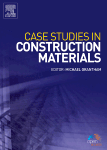
Case Studies in Construction Materials
Pioneering Research in Material Science ExcellenceCase Studies in Construction Materials, an esteemed journal published by Elsevier, provides a vital platform for the dissemination of scholarly research in the field of materials science, focusing particularly on innovations and advancements in construction materials. With its Q1 ranking in the 2023 Scopus category of Materials Science (Miscellaneous), the journal stands out for its high-impact contributions and commitment to enhancing industry practices. Open Access since 2014, Case Studies in Construction Materials promotes wide accessibility and engagement, encouraging collaborations among researchers, professionals, and students globally. Whether delving into innovative methodologies, sustainability in construction materials, or case studies that exemplify best practices, this journal is crucial for those seeking to advance the science and application of construction materials. Located in Amsterdam, Netherlands, its robust publication history from 2014 to 2024 ensures it remains a leading resource for contemporary research and academic exploration.
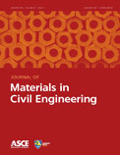
JOURNAL OF MATERIALS IN CIVIL ENGINEERING
Advancing Innovation in Civil MaterialsJOURNAL OF MATERIALS IN CIVIL ENGINEERING is a highly regarded publication within the field of civil engineering, published by the ASCE-American Society of Civil Engineers. This journal, which has been actively contributing to the discourse in building and construction materials since 1989, has established itself as a vital resource for researchers and practitioners alike, evidenced by its impressive Q1 rankings across multiple categories, including Building and Construction, Civil and Structural Engineering, Materials Science, and Mechanics of Materials as of 2023. With a strong focus on innovation and application in materials technology, it provides insights that are paramount for advancing practices in civil engineering. The journal's commitment to disseminating high-quality research is reflected in its exceptional standing within Scopus, where it ranks in the top quartile of its respective fields. Although not an open-access journal, it remains an essential platform for disseminating impactful research findings and fostering professional development in the materials science community. For more information or to explore the latest publications, researchers can access the journal through the ASCE library.
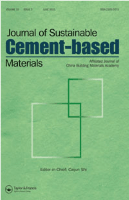
Journal of Sustainable Cement-Based Materials
Pioneering eco-friendly solutions for construction materials.Journal of Sustainable Cement-Based Materials, published by TAYLOR & FRANCIS LTD, is an esteemed academic journal dedicated to advancing the field of sustainable construction materials, particularly within the realms of cement-based technologies. With its ISSN 2165-0373 and E-ISSN 2165-0381, the journal emphasizes impactful research focused on environmentally friendly practices and innovations in material development. Based in the United Kingdom, it has garnered a strong reputation, evidenced by its Q1 rankings in both Ceramics and Composites and Waste Management and Disposal categories for 2023. The journal provides a vital platform for researchers, professionals, and students aiming to explore topics from recycling methodologies to carbon footprint reduction in cement production. Although it is not an Open Access publication, the journal's commitment to disseminating high-quality, rigorous research makes it an essential resource for those pursuing advancements in sustainable construction practices.

Cement Wapno Beton
Pioneering Research in Building and Materials ScienceCement Wapno Beton is a renowned academic journal published by STOWARZYSZENIE PRODUCENTOW CEMENTU, focusing on the intricate fields of building and construction, as well as materials science. With the ISSN number 1425-8129, this publication has been committed to advancing knowledge and fostering innovation since its inception in 2007, and it will continue until 2024. The journal operates within a competitive landscape, as reflected in its 2023 Scopus rankings, placing it in the third quartile (Q3) in both Building and Construction and Materials Science categories. Although it currently does not offer open access options, Cement Wapno Beton remains an essential resource for researchers, professionals, and students seeking valuable insights into the latest developments and technologies in construction materials. Its scope encompasses a wide range of topics, including architectural advancements, sustainable building practices, and innovative material applications, making it an indispensable tool for those dedicated to the evolution of construction science.
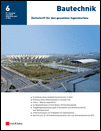
Bautechnik
Exploring the forefront of building technology and methodologies.Bautechnik is a premier academic journal in the fields of Building and Construction and Civil and Structural Engineering, published by ERNST & SOHN in Germany. With a history dating back to 1969 and a significant converged timeline through various years, this journal offers a rich repository of peer-reviewed research dedicated to advancing the principles, methodologies, and innovations within its domains. Bautechnik is currently ranked in the Q3 category for both building and construction, as well as civil and structural engineering, indicating its relevance and contribution to the academic community. Though it does not offer open access, its curated content is accessible to a global audience of researchers, professionals, and students striving for excellence in their fields. The journal aims to foster discussions and disseminate knowledge that impacts the future of construction, architecture, and engineering practices.
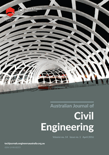
Australian Journal of Civil Engineering
Shaping the Landscape of Civil Engineering KnowledgeThe Australian Journal of Civil Engineering, published by Taylor & Francis Ltd, stands as a pivotal platform within the field of civil and structural engineering. With an ISSN of 1448-8353 and an E-ISSN of 2204-2245, this journal consistently delivers high-quality research and innovative practices from both established and emerging scholars in the discipline. Recognized in the Q2 category for Civil and Structural Engineering in 2023, it holds a respectable position, ranking 146 out of 379 within its field according to Scopus, which places it in the 61st percentile. Converging valuable insights from 2011 through 2024, the journal encompasses a broad scope of topics, including sustainable infrastructure, innovative materials, and advanced construction techniques, thereby addressing contemporary challenges faced by engineering professionals. Though it is a traditional publication without open access options, the quality of the research featured ensures that it remains an essential resource for academics, practitioners, and students striving to enhance their knowledge and contribute to the dynamic field of civil engineering.

Revista de la Construccion
Exploring Cutting-Edge Solutions in Construction EngineeringRevista de la Construcción is a pivotal academic journal dedicated to the field of civil engineering and construction, published by the prestigious Pontificia Universidad Católica de Chile, Escuela de Construcción Civil. With its ISSN 0718-915X, this journal serves as a crucial platform for disseminating innovative research, case studies, and advancements in construction methodologies that address contemporary challenges within the industry. While currently not classified as open access, it provides valuable insights benefiting researchers, professionals, and students engaged in construction development and sustainability. The journal enhances the academic discourse and contributes significantly to knowledge in engineering practices, project management, and material science. Based in Santiago, Chile, the journal aims to foster collaboration and knowledge exchange among experts both locally and globally, making it an essential resource for those striving to advance the science and practice of construction.
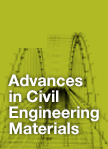
Advances in Civil Engineering Materials
Pioneering Sustainable Solutions for Modern EngineeringAdvances in Civil Engineering Materials, published by the American Society for Testing and Materials, is a leading journal in the field of civil engineering, specializing in the innovative applications and developments of materials used in construction and infrastructure. With an ISSN of 2379-1357 and an impressive lineup of contributions from renowned researchers, this journal serves as a pivotal platform for disseminating groundbreaking research from 2012 to 2024, currently enjoying a category quartile ranking of Q2 across multiple disciplines including Ceramics and Composites, Civil and Structural Engineering, and Materials Chemistry. Though it operates under a subscription model, the valuable insights and advancements presented in the journal have a significant impact on both academia and industry practices. Researchers, professionals, and students are invited to explore the evolving landscape of civil engineering materials, gaining critical knowledge to drive innovations and contribute to the sustainability and safety of architectural endeavors.
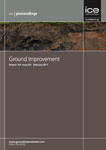
Proceedings of the Institution of Civil Engineers-Ground Improvement
Advancing Ground Improvement for Sustainable InfrastructureProceedings of the Institution of Civil Engineers-Ground Improvement is a distinguished journal published by EMERALD GROUP PUBLISHING LTD, dedicated to advancing knowledge and research in the fields of Building and Construction, Geotechnical Engineering, Mechanics of Materials, and Soil Science. With an ISSN of 1755-0750 and an E-ISSN of 1755-0769, this journal has been a vital platform for disseminating innovative research since its inception in 2008. With an impact factor placing it in the Q3 category across multiple engineering disciplines, it ranks favorably in Scopus, ensuring visibility and recognition among scholars globally. The journal offers open access options, allowing for broader dissemination of research findings. Targeting researchers, professionals, and students alike, it aims to foster discussions on ground improvement technologies and methodologies that are essential for sustainable infrastructure development. As it continues to converge its focus until 2024, the Proceedings stands as an imperative resource for those seeking to elevate their understanding and contribute to the ever-evolving field of civil engineering.